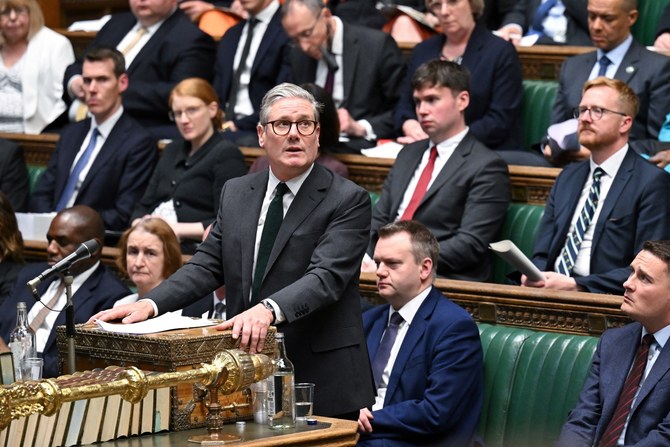
As the UK’s opposition Labour Party sets out its plans for winning the next general election, the governing Conservative Party slowly resigns itself to losing the election, which must be held by Jan. 28, 2025, at the latest. British voters are once again in the firing line of both parties’ pledges and promises to woo them, either with more tax cuts and indirect taxation, as this Conservative government knows how to do best, or by Labour leader Keir Starmer’s vision of “Ode to Joy” — yes, the EU anthem, which he said best summed up his party, maybe meaning that his Labour Party represents the best hope for the future of the country.
The Labour leader, who voted to remain in the EU in 2016, has ruled out returning to the single market or the customs union and bringing back free movement if his party wins power, as Brexit remains a toxic political issue among UK voters. But he has promised to pursue closer relations with key EU countries like Germany, France and Poland.
The party sitting in opposition since 2010 is raring to go and seems to be on a war footing, revealing snippets of its plans for government should it win the election, with polls over the past two years putting it as much as 20 points ahead. Labour’s recently revealed pledges include working for economic stability, improving the National Health Service, creating a border security command to tackle irregular immigration and a publicly owned clean energy company, and recruiting more police and more teachers. Starmer often repeats that “there is no quick fix to the mess that the Tories have made of this country,” promising instead a decade of “national renewal.”
Even Brexiteers admit that post-Brexit Britain is being held back by things like ‘poor international trade’
Mohamed Chebaro
As a voter who believes the UK has long been desperate for a serious new government, I am afraid the country needs a “new deal” and not just a new government if the country’s decline — emanating from weak leadership, poor finances and even Brexit — is to be reversed.
Labour therefore needs to be bold and prepare to deal with the adversities it will inherit. Even Brexiteers have admitted recently that post-Brexit Britain is being held back by things like “poor international trade” and “weak leadership,” as revealed last week by the new Chandler Good Government Index report. In the index, the UK has dropped from 10th place to 11th, partly because it ranked 28th on international trade due to its changed trading relationship with the EU.
The index’s survey revealed that 56 percent of UK businesses said they were having difficulty trading under the Brexit rules introduced at the end of 2022. The problem, of course, is that the Conservatives felt it would be OK for the costs of overcoming trade barriers to be borne by the people. According to experts at the Bank of England, Brexit is making British food more expensive, although it does not need an expert to reveal that, as everyone in the country senses this on a daily basis at the supermarket tills.
And it is not only the UK’s shopping baskets that have been affected. Medicines for the NHS are now more expensive and harder to get in a health service that has been starved of cash and staff after years of self-imposed austerity by successive Conservative governments. As if that were not enough, new import charges on products like fish, sausages and cheese were implemented at the end of last month, adding bureaucracy costs of up to £145 ($184) per shipment. The picture is no better for large businesses either, with Brexit being bad for the automotive industry in particular, as its supply chains have taken a major hit after decades of effective integration were thrown out of the door as a result of Brexit.
“Taking back control” means that the UK and EU have diverged, so buying and selling needs more bureaucracy, paperwork and border clearances, whether virtual or physical, with all these factors combining to make everything more expensive.
It is not an exaggeration to claim that the UK needs a revolution to rebuild what years of poor Conservative leadership have broken
Mohamed Chebaro
Against such a backdrop, it is a shame that Conservative Prime Minister Rishi Sunak continues to delay the call to go to the polls, denying the nation an immediate restart. Any incoming government will need time to adjust and, to be fair, Starmer has a huge mountain to climb. The country needs something more than just a change of government, it needs something akin to the “New Deal” adopted in the US between 1933 and 1938 under president Franklin Roosevelt, which provided support to farmers, the unemployed, youth and the elderly. The UK’s new deal may not necessarily be as extensive as that, or even the one adopted by Tony Blair’s “New Labour” in 1998, which was funded by a windfall tax on privatized utility companies and sought to reduce unemployment by providing training, subsidized employment and voluntary work for the unemployed.
It is not an exaggeration to claim that the UK needs a revolution to rebuild what years of poor Conservative leadership have broken, especially trust in the political system and the ability of various government departments to deliver and be accountable to citizens. A reboot is needed for the country to rediscover its belief in the education sector, the NHS, the police and the broken justice system.
The new government led by Starmer, if Labour wins, should find ways to instill belief, maybe through a commitment to train and retrain, to protect and support, regenerate, update and to more effectively level up, and not just through ticks on consultants’ spreadsheets.
Yes, maybe all of that needs funds and the country is already overtaxed, with the Conservatives having surely squandered all the reserves, meaning Labour, like all parties, cannot allude to raising taxes at this time. But a good start to the new deal would be for the incoming government to show courage, leadership and decency. It must instill renewed belief and certainty among the people after years of division. Above all, it needs to bring back hope, which has been deficient among the electorate on both the right and the left in an increasingly conflictive and changing world.
A new government led by the Labour Party under Starmer might just be the way to return to Britain some of its “Cool Britannia,” which has been lost under the Conservatives. It has also been reported that the UK’s post-Brexit passport ranking has, like its reputation, slipped behind the likes of Italy, France and Spain in terms of the doors it opens.
Mohamed Chebaro is a British-Lebanese journalist with more than 25 years’ experience covering war, terrorism, defense, current affairs and diplomacy. He is also a media consultant and trainer.
Disclaimer: Views expressed by writers in this section are their own and do not necessarily reflect Arab News" point of view












